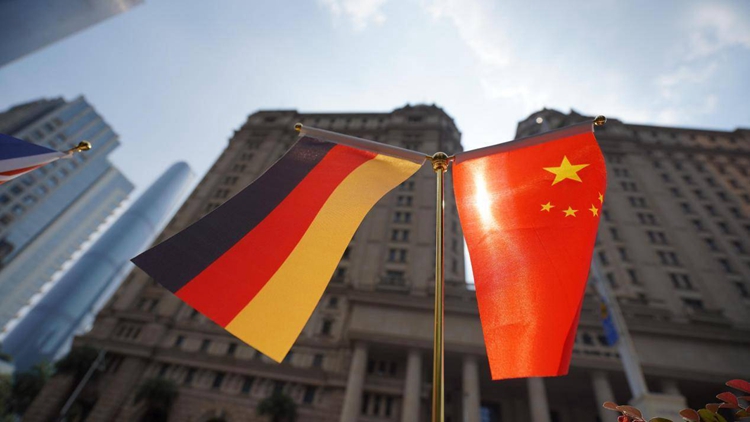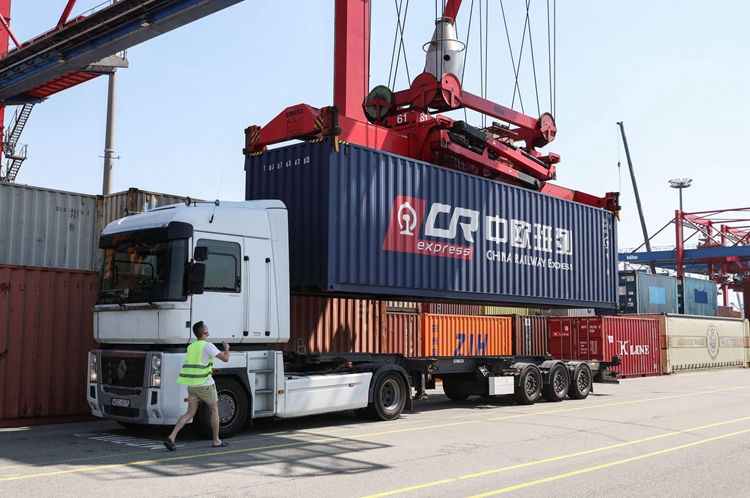A number of German chambers of commerce and business representatives said in an interview with this reporter recently, Germany and China economic and trade cooperation is the key foundation for the development and prosperity of both sides, looking forward to the two sides to promote cooperation, maintain dialogue and communication, to avoid "decoupling and breaking the chain".
China is still attractive
German-Chinese economic federation, director of the White Hickok told reporters, looking at the German-Chinese economic relations, China has been Germany's largest trading partner for seven consecutive years, more than 5,000 German companies in China, more than 2,500 Chinese companies in Germany, "these data show how close the links between China and Germany.
According to Bai Xike, the German-Chinese Economic Federation was founded in 1987, is an important public welfare association in Germany to build German-Chinese economic relations, and has always been committed to promoting bilateral economic and trade cooperation between Germany and China.
White Hickok said that the German-Chinese Economic Federation is "a mirror reflecting the bilateral economic and trade cooperation between Germany and China", there are more than 350 member enterprises from Germany and China, mainly in the industrial and tertiary sectors. Among them, German small and medium-sized enterprises (SMEs) account for about 90 percent, in addition to German multinationals such as SAP and Bayer, as well as Chinese companies such as Huawei, ZTE and Weichai Power.

Bai Xike said, "As a representative organization of Chinese and German companies, we always support fair free trade and trade openness."
According to Bai Xike, the German-Chinese Economic Federation helps German and Chinese companies gain a deeper understanding of the policies, regulations and latest trends of the two countries, provides opportunities for extensive exchanges with partners in different fields, expands bilateral investment and trade exchanges, and creates a better environment for cooperation between the two sides.
"Reaching more trade agreements, ensuring open markets and the free exchange of goods are crucial for the economic development of all countries." She added, "What is clear for both China and Germany and all parties involved is that we should not move towards 'decoupling', especially in the era of globalization."
Germany's "Wirtschaftswoche" published an article on August 21, management consulting firm FTI-Andersch released on August 21 commissioned market research firm Cato to conduct a survey shows that every two companies in the manufacturing industry, one of which believes that (China) the Asian country is attractive.
According to the article, for most German companies, China is still an attractive place. According to German companies investing in China, they often find it easier to find suitable employees than in Germany. And according to information from the German government, there is currently a shortage of skilled workers in 352 of Germany's 801 occupational categories. A recent analysis by the Cologne-based German Institute for Economic Research concluded that nearly 540,000 jobs are currently vacant on a regular basis.
The survey shows that about 84 percent of companies active in China want to stay there. About 73% of the respondents ruled out moving their production network out of China, and 1/5 want to realize a more diversified production network in Asia in the future.
Economic and trade relations are progressing well
In the Frankfurt-Rhein-Main region, which is regarded as one of the most important international business centers in Europe, more than 800 Chinese-funded enterprises or enterprises with Chinese-funded backgrounds are active, and the size of the local Chinese community is steadily expanding, according to Du Xinting (Veronique Dunay in foreign language), the head of the Center for Sino-German Economic Cooperation at the Chamber of Commerce and Industry in Frankfurt, Germany.
According to the report, the Center for Sino-German Economic Cooperation of the German Chamber of Commerce and Industry in Frankfurt was established in 2007, which mainly organizes activities such as information exchanges, cross-cultural training and business roundtables, and provides consulting and assisting services for German enterprises doing business in China, Chinese-funded enterprises in Germany, as well as small and medium-sized enterprises that are ready to enter the international market.
"After talks and discussions with representatives of German and Chinese enterprises, my intuitive feeling is that bilateral economic and trade relations between the two countries have progressed smoothly in the first half of this year." Du Xinting said.
According to Du Xinting, improving the regional competence of experts and managers on both sides will be a decisive factor in the future development of the German-Chinese economic and trade relationship, and the business community needs regional expertise to weigh risks and opportunities and to promote long-term cooperation.
Du Xingting is concerned that the growing political need to minimize economic risks and increase diversification is spreading a sense of insecurity in the business community, which is "exacerbated by unclear policies and regulations issued by governments, as well as by various foreign trade instruments".
Unwilling to lose the Chinese market
German Chamber of Commerce and Industry international economic policy and foreign trade law expert Melanie Fogelbach said recently that the United States to limit investment in China's initiatives to trigger the concern of German enterprises, the so-called "foreign investment screening" may result in excessive regulation.
She suggested that the goal of the European foreign trade strategy must be to accelerate the promotion of the global market and the opening of investment places, rather than the government-led foreign trade.
For Thin Den Berg (foreign name Heino Budenberger), CEO of German steel company Wälzholz Group, business decisions should strive to distance themselves from political issues.

"China is currently the largest producer and consumer of steel in the world. When it comes to manufacturing, be it automotive or other industries, China is the largest market in the world and we must of course focus on China."
As a family-owned company founded in 1829 and a "hidden champion" in the field of cold rolled steel strip, Wälzholz Group has continued to take root in China, setting up a service center in China in 2007 and the first German cold rolled steel mill in China in 2014.
Thin Denber said, the Chinese branch of the Wälzholz Group and the German headquarters is a family, "I don't understand what politicians refer to when they talk about 'de-risking', we live on the same planet, we can't expect all places to be exactly the same as their own country".
Thin Denber points out that many of the people who are talking about China have never even been there. "When I first went to Taicang, Jiangsu province, in 2005, there weren't any hotels to stay in; today, it's changed dramatically. Why should I stay away from the Chinese market?"
When asked what impact policies such as "decoupling and breaking the chain" would have on business development, Bo said he was not even willing to calculate the cost of losing the Chinese market, which is a purely theoretical possibility. "What does 'decoupling' mean? Sure I could sell our company, but why?"
According to Bo Denber, the business community shouldn't put too much emphasis on political topics, but rather focus on economic factors. Thin Müller (foreign name Martin Brudermüller), chairman of the executive board of the German chemical giant BASF, has impressed Thin Denber by pointing out that the investment in China was the right decision. "Regardless of what politicians say, I share this view. We live in the same world and we have the same market."
As the interviewed German business representatives said, it is crucial for Germany and China to maintain communication, especially in the field of economy and trade, and they are looking forward to the in-depth development of the relationship and expanding the prospects for cooperation.

